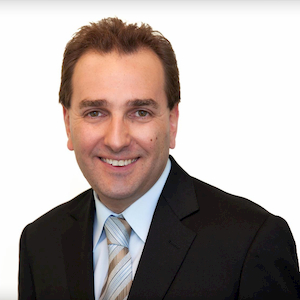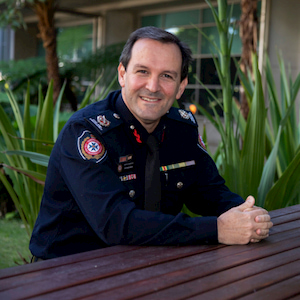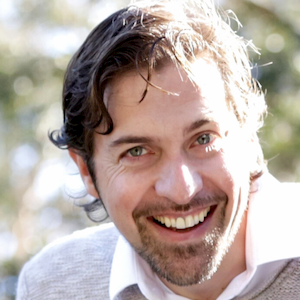Did you read the great insights we recently shared from a group of male allies about how men can promote gender equality in the workplace? Well, they didn’t stop there… With women spending twice as much time on unpaid work as men (inevitably impacting their prospects of career progression), the role of a male ally must go beyond the workplace. Here’s what our male allies shared about how they also continue their gender equality efforts at home.
What are the behaviors you role model as a male ally at home?
.png)
Greg Leach | Commissioner, Queensland Fire and Emergency Services
At home, I make sure I’m aware of the responsibilities that make up the “mental load” (or emotional labor) and take active steps to make sure I do my part.
I have a son and a daughter, both in their twenties, and elderly parents. My partner is a legal professional in a very demanding field. While the mental load in my household is less than a family with small children, for example, it is important to share the household roles and responsibilities equally so we both have the time to pursue interests as individuals and together.

Tom Bills | National Brand Partnerships Leader, Lion
I am a staunch advocate for primary caregiving being equal. For example, through Lion’s flexible work policy I enjoyed taking three months leave to be a full-time carer for both my girls and worked four days a week in 2019. I think it’s really important to show my daughters fairness and equality in the running of all household decisions and activities, and I’ve always encouraged gender-neutral toys, sports, and activities for the girls. If I had boys, they’d play footy – so why can’t the girls? But ultimately, they get to decide, and I think that’s the greatest thing of all.

Martin Chappell | GM Minerals and Energy, Motorola Solutions
I promote the fact that I am involved in gender equality at work and my language in conversations is consistent with the values that underpin the cause. I highlight regularly to both my son and daughter who are at co-ed schools, why we chose that path for them ahead of other options.

Phong Vuong | Site Manager, Programmed Industrial Maintenance
I have two kids, Jack (8) and Sophie (11). There are no male or female jobs to do around the house. The kids share these equally. There is no such thing as “Jack does the heavy lifting” and “Sophie does the laundry”. If there is a barrier, then let’s look at how we can overcome it and what can we put in place so that the job can be done.
I recently started a family project. We are building remote controlled cars from scratch. It’s a “boy thing to play with cars”, but the kids equally love doing it and that’s what I want to promote.

Phil Carbins | State Strategy & Program Manager NSW/ACT, SUEZ Recycling & Recovery
Every task, every toy, every game, can be undertaken and enjoyed by everyone.

Jonathon Rossiter | Superintendent for Site Operations Centre, OZ Minerals
I have an amazing partner at home and we have three kids now. A boy who is 4 years old and twin girls who are 5months old. I think about the type of work environment that my children will be a part of in the future and I’d like to think it will be gender equal with no pressure imposed on whatever roles they choose to do and that they will have the support of all colleagues regardless of gender. Likewise I think it’s important that women in the workplace know they have allies around who have got their back!

Steve Schofield | Group Head of Human Resources and Industrial Relations, Downer Group
As a dad of five boys, I model behavior for the lads about the importance of self-awareness and the fact that feedback is a gift. In addition, I often refer to the emotional transaction – Impact versus Intent – and to always strive to see, feel and comprehend those opportunities to be better.

Tim Oudenryn | National Planning & Business Development Manager – Asphalt, Boral Australia
My behaviors at home are no different to my behaviors at work. I am lucky to be married to a very strong, independent, intelligent and opinionated woman. She helps me learn, and reminds me daily, how I can do my part to improve gender equality in the workplace and in society.

Sergio Cinerari | Chief Operating Officer – Australian Operations, Downer Group
I have three daughters and I try to always support their ideas and seek out their input. I don’t think I always get this right, but I know that this is important. In all situations away from work we should be listening more and inquiring deeper in order to make everyone feel their contributions are valued and important.

Con Balaskas | Managing Director, Motorola Solutions
Being self aware and teaching my boy about fairness and equality are behaviors that I role model at home.

John Costello | Commercial Superintendent, Evolution Mining (Cowal)
The very same fundamentals [as in the workplace] – communication, respect and fairness. There is nothing so severe that cannot be overcome with a little honest conversations and some diplomatic give-and-take.

Brad Yelland | Chief Technology Officer, BAE Systems Australia
I have two adult daughters living at home and an adult son who no longer lives at home. My wife and I have always provided equal opportunity and support to our kids in all areas, facilitating their career and life development in whatever direction they choose. The three are all individuals and all have their personal strengths, weaknesses and uniqueness.
As a family we embrace these differences, whether through robust and diverse dinner table conversations, listening to and valuing each other’s inputs, and challenging and supporting ideas and views, or by supporting each other in our different activities – career, education, cultural, recreation and sport. My wife and I have also promoted travel, within Australia and internationally – not just as recreation, but as a necessary activity to broaden our perspectives on the world, on the different cultures, histories and values, as the ultimate understanding of the benefit of diversity and the value of individual contribution.

Phil Fraser | CEO of QInsure, QSuper
With two daughters and an older son, it is a perfect opportunity to role model that equality and fairness is the only way, with respect for his sisters and mom to be there at all times. My daughters are encouraged to be involved in whatever they see as important to them, supported to be whatever they want to be and that they know they can be. They are encouraged to make sure they have their own success and happiness, whatever that may be. My wife has a strong personality and is the leader of our home, so again hopefully a situation that is normal for our kids.

Mark Roche | Deputy Commissioner, Readiness and Response Services, Queensland Fire and Emergency Services
I am lucky enough to have strong women in my personal life for whom I advocate. My wife and daughter are career-driven and passionate about their professions. We have open discussions and seek advice about each other’s work struggles and most importantly, we celebrate each other’s professional successes.
As an ally, I acknowledge the importance of my wife’s schedule as equivalent to my own, and therefore we are flexible in our roles when it comes to family life to make sure that no one person is burdened by domestic duties and load is shared.

Stephen Smith | Assistant Commissioner Human Capital Management, Queensland Fire and Emergency Services
I treat everyone equally. I try to be as interested, supportive, and encouraging of their lives and decisions as I can. I have ensured that being a woman was never a limiting factor either in reality or in thought, and I have always made them believe they were equals of anyone and could do and achieve anything they set their mind to.
I have also been careful to raise them in the ‘real’ world. Not to fear anything, but so their eyes are fully open to the inequality that does exist, and to be aware of their environment and the risks that are in it. I try to provide opportunity, push and challenge thinking, and provide a safe haven when they need it.

Drew Bradford | Executive, Markets – NAB
Fairness is key at home. We have a diverse household and are focused on being fair with our children. By embracing their strengths, we can provide them with opportunities to support their individual talents and dreams. We aim to role model fairness, with a view that consistency of approach will support them in their approach with others, as well as when they enter the workplace.

Nick Blackwell | Project Manager, Woolworths Group
Together with my partner, we try to anticipate the upcoming demands of the week, and work out how to equally share both the planning and execution so that the household runs smoothly. With the kids, we always encourage their participation with household tasks, and mutual respect as a key value. I also like to talk with the kids about gender equality to foster a sense of ally ship and commitment to this important topic.

Robert Bedwell | CEO, J.P. Morgan, Australia and New Zealand
I have two favorite sayings at home that I repeat often: (1) a problem shared is a problem halved and (2) it doesn’t matter where you start, it’s all about where you finish. This is my way of promoting the importance of psychological safety and shared perspective, being transparent and also being courageous and resilient.
As a family we talk often, especially around the dinner table, and every topic is open for discussion. These nightly events afford all of us, including me, the opportunity to discuss issues we are facing in our daily lives, events that are happening in the world or “fun facts” (as my middle daughter calls them) that one of us has learnt. By being present in each other’s lives like this helps to build collective resilience on a daily basis. Furthermore, when I have taken on board the advice of my family, I playback the outcome which reinforces the value I place on their input.

Steve Honey | Senior Director – Global R&D Tech Transfer, CSL Limited
My wife and I have a daughter and a son and I try to share the load where I can. Our extended families don’t live in Melbourne and my wife was fortunate her employer allowed her to work part-time after the kids were born. I was also fortunate to negotiate one day a week work from home, or day off, to help my wife transition back to the workforce. I am team manager of my daughter’s netball team and cannot believe this highly skillful, exciting game is not played more widely in other countries!

Paolo Spinetti | ANZ Environment and Safety Manager, USG Boral
I’m lucky to have two children, both with different interests and personalities. How I treat them is based on their individuality and personality, not by their gender. I choose my language carefully and am very careful not to praise something just because of a silly gender stereotype. I don’t focus on praising my daughter if she is first amongst the girls. I ask her what we are going to do so that she has the fastest time in the pool. And when my son wanted to dance ballet, who cares what the people in the shop thought when walking him to class? I paid no attention to them and focused on the joy that dancing brought him.
So for me it’s very simple. To be a good role model, forget all the stereotypes that you have been exposed to via commercial TV, radio, and religion. Focus on what is making your children and your partner happy. Explore together those interests. As long as it’s not harming themselves or others, allow them the degrees of freedom to explore what this world has to offer them, unhindered by gender expectations.

Michael Stange | Global Head of Product Engineering, Iress
I acknowledge and am conscious of the roles my wife and I play at home as parents and as role models to our children. Our actions, behaviors and the language we use when we communicate play a significant role in shaping our children’s world view. We openly discuss topics such as sexism, racism and misogyny at home with and in front of the children, ensuring we are clear on our values and beliefs.
Our lives have been heavily influenced and shaped by our professional career choices and by the inherent community values. These have become convenient excuses to maintain the status quo of home workload inequality and habit forming. What I need to do at home to be an ally, is ask what I can do to be an equal partner and create a plan that works for us both and which seeks to ensure an equal and unbiased allocation of the domestic responsibilities.
